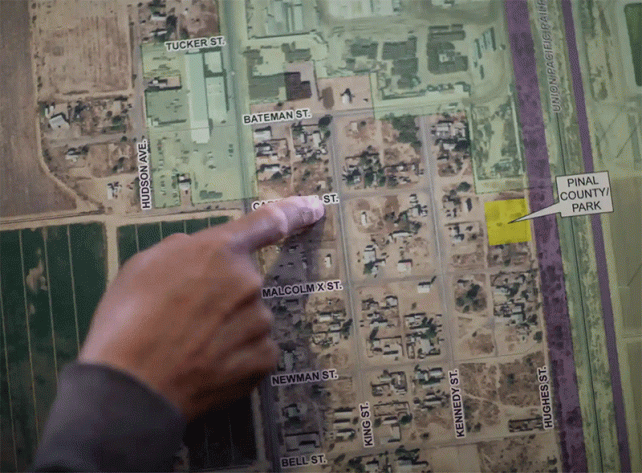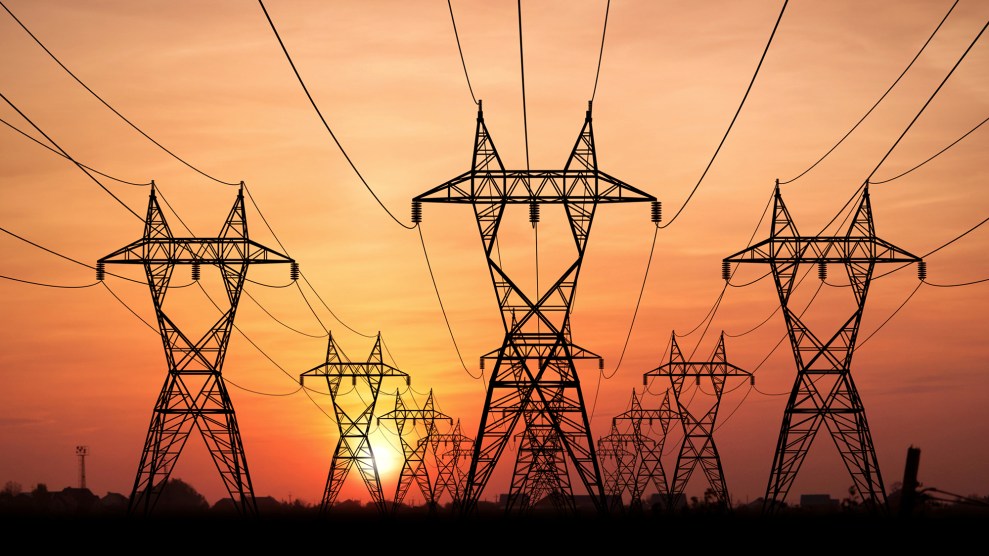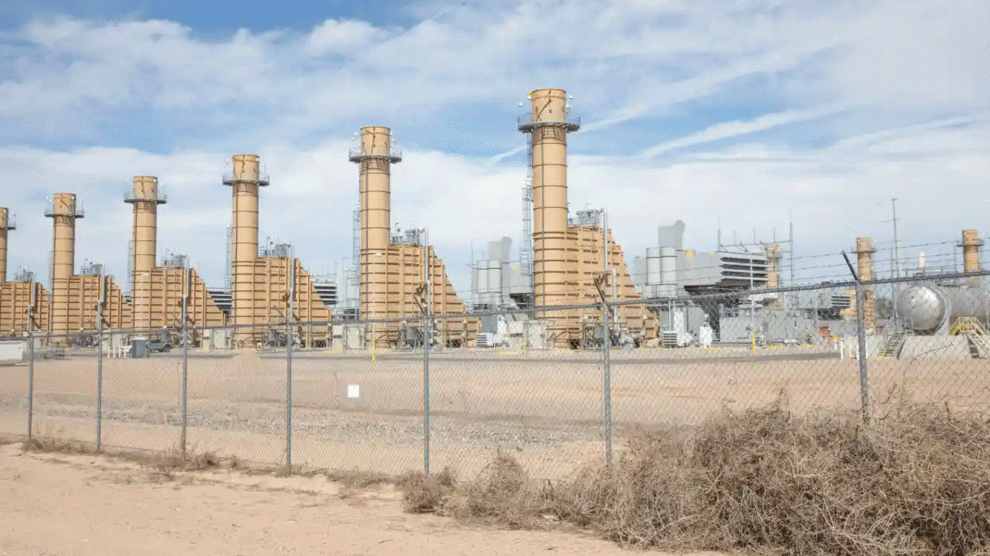
The stacks of the Salt River Project generating station near Randolph, Arizona. Caitlin O’Hara/Guardian
The United States is on the brink of its most consequential transformation since the New Deal. Read more about what it takes to decarbonize the economy, and what stands in the way, here. This story was originally published by the Guardian and is reproduced here as part of the Climate Desk collaboration.
A handful of weary residents gathered at the windowless Randolph church to mull over the latest effort by an electric utility to expand its power station—a polluting gas-fired plant next door to the community that the state regulator has blocked on environmental and health grounds.
Randolph is a historic Black community in central Arizona flanked by railroads and heavy hazardous industries, a small dusty place where residents are exposed to some of the worst air quality in the state while lacking basic amenities like fire hydrants, trash collection and healthcare.
Last year, the community celebrated a historic win when the state regulator rejected a proposal by the public utility Salt River Project (SRP) to more than double the size of its power plant, ruling that it would cause further harm to Randolph residents and was not in the public interest.
It was major victory for clean energy and environmental justice in Arizona, according to the Sierra Club, the environmental group which condemned the proposed expansion as “textbook environmental racism.”
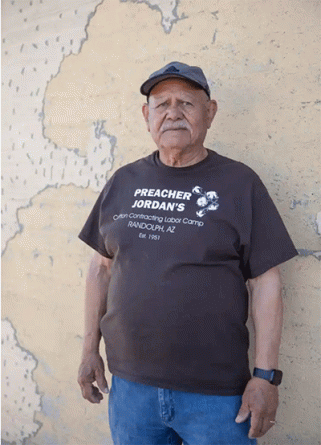
Ron Jordan’s family has lived in Randolph since the 1930s.
Caitlin O’Hara/Guardian
But SRP has refused to take no for an answer, and residents fear that the state regulator might reverse its decision. “We won, they lost, but they won’t accept it, and keep coming back. This is not democratic,” said Ron Jordan, 77, whose family has lived in Randolph since in the 1930s. “They are dangling goodies in front of us, but the community doesn’t want it, we already have too much pollution. This isn’t right.”
At a recent community meeting held at the modest church, SRP offered to finance a new community center, air quality monitoring, and $50,000 in landscaping and signage among other projects if residents dropped their opposition to power plant expansion. “We’re not giving up no matter what they offer,” said Guadalupe Felix, 45, whose family have lived in Randolph for three generations. “This plant is going to kill us, we’re already suffocating.”
The community says it won’t back down, but nationwide utilities have a track record of getting what they want, according to David Pomerantz, director of the Energy and Policy Institute (EPI). “Refusing to take no for an answer is incredibly common.”
Randolph is an unincorporated town in Pinal county first settled in the 1920s and 30s by mostly Black families from Texas, Oklahoma and Arkansas who came to pick cotton in the Gila River valley. It was one of the only places Black families could buy property, and by the 1960s the close-knit agricultural community, which was also home to Mexicans and Native Americans, boasted thriving stores, bars, churches and gas stations.
Mechanization of the cotton industry led to the community’s economic and population decline, after which the nearby town of Coolidge began annexing the land around Randolph and converted it into an industrial area.
Today, only 150 or so residents live in an area the equivalent of seven football fields long by three fields wide, some in houses or plots purchased by their ancestors. There’s no store, no bar, no gas station and no park, just the church with a single lofty palm for shade.
The agricultural fields and desert plains where children would ride their bikes and chase roadrunners are long gone, and Randolph is now virtually surrounded by polluting infrastructure including gas plants, pipelines, a hazardous waste site and a steel company contracted to manufacture Donald’s Trump’s border wall.
The community is literally surrounded by cumulative and acute hazards.
Pinal county has some of the worst air pollution in Arizona, according to the American Lung Association and the Environmental Protection Agency. It is also bearing the brunt of the climate crisis with farmers forced to leave fields fallow or sell them off, many to solar farms, due to ongoing drought and water shortages. In August 2021, a gas pipeline explosion threw Randolph residents out of bed, igniting a huge fireball that killed farm worker Luis Alvarez and his 14-year-old daughter Valeria.
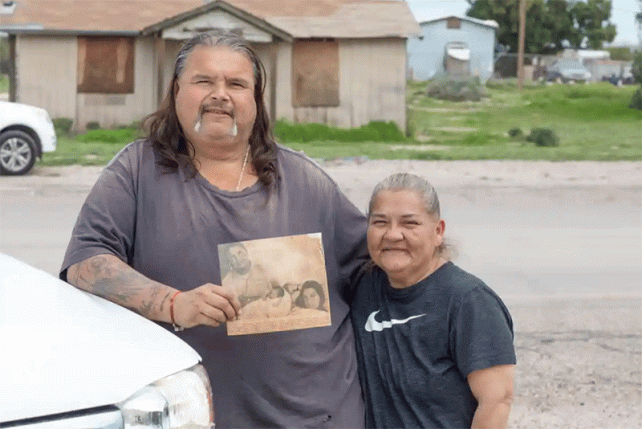
“We’re not giving up no matter what they offer,” said Guadalupe Felix, pictured with her husband, Esteban Valencia.
Caitlin O’Hara/Guardian
The ACC is the state utility regulator responsible for approving SRP’s power plants and transmission lines, as well as rate hikes and new energy projects for private energy, water and telecommunication utilities. Every state has a version of the ACC, most commonly referred to as a public utilities commission (PUC).
As the community, the Sierra Club and others organised against the plant expansion, SRP announced plans to help finance road paving, landscaping projects and a scholarships and job training program, as well as an attempt to get Randolph recognised as a national historic place.
In April 2022, the ACC rejected SRP’s expansion plan after concluding that the power company had failed to consider viable green energy alternatives such as solar and battery storage before pursuing the power plant expansion—which would worsen air quality especially for Randolph residents who live next door. (The commission rejected a recommendation by its power plant and line siting committee to grant the environmental certificate.)
SRP requested a new hearing, which the ACC denied. The utility then filed—and lost—a lawsuit at the Maricopa county superior court. “The [ACC] determined that the need for the proposed project is outweighed by its environmental impact. SRP has not shown that decision to be unlawful or unreasonable,” the court ruled in January 2023.

